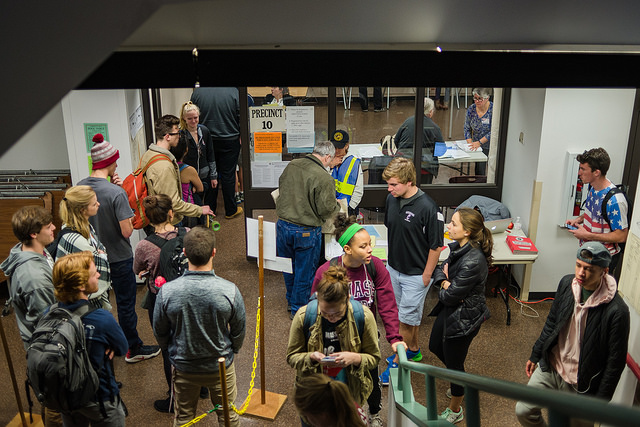With less than a month until voters hit the polls, advocates from across the political spectrum are ramping up their efforts in order to campaign for and against ballot Question 3.
The ballot question asks voters if they want to uphold or repeal Senate Bill 2407, a bill that was passed and instated in 2016. According to the ballot question, this law “prohibits discrimination on the basis of gender identity in places of public accommodation.”
A short time after the bill was originally passed in 2016, a group of citizens filed a repeal initiative with the Secretary of State’s office and the Ballot Question Committee. The Attorney General approved their petition, after which the campaign began collecting signatures. Over 30,000 signatures were certified, officially placing the repeal question on the November ballot.
“Keep MA Safe,” the “no” campaign, did not reply to requests for comment. According to their website, the group believes that the law “endangers the privacy and safety of women and children in public bathrooms, locker rooms, showers, dressing rooms, and other intimate places, because anyone—regardless of intentions or anatomy—can be there at any given time. The law does not have a process to distinguish between people that this bill was intended to help and criminals who will abuse it to prey on others.”
They further that “This law was a broad overreach and is at odds with individual safety and privacy for everyone in the Commonwealth. The Legislature rejected an exemption for convicted sex offenders, meaning convicted sex offenders can use any restroom, locker room, shower or dressing room at any time just by claiming a certain gender identity.”
Matt Wilder, the spokesperson for “Freedom for All Massachusetts” and the “Yes on 3” campaign, countered, “This law does not protect anyone who engages in criminal activity…If someone does commit a crime in one of these spaces, they will be arrested and charged as they should be.”
Regarding the “Yes on 3” campaign strategy, Wilder explained “We’re really trying to focus on reaching as many voters as possible. Our field team has been knocking on doors and making phone calls and holding town halls for well over a year now. We’ve reached about tens of thousands of voters personally and we think that’s going to make the difference come Election Day.”
“These days everyone’s online and everyone has a Facebook account, so we are using that as a way to reach people to ensure that they, particularly our base, are not becoming complacent or taking anything for granted,” he added, noting the role that social media plays in this campaign. “We are being intentional in our approach to reach them, to keep them updated on what’s happening in this campaign, and to ensure that they understand what’s at stake.”
Gillian Branstetter, media relations manager for the National Center for Transgender Equality, also commented on her organizations work and collaboration on the effort, stating, “We’ve worked diligently with ‘Freedom for All Massachusetts’ on spreading the word about Question 3 and dispelling many of the myths and misconceptions people have about the 2016 law.”
Branstetter added, “Transgender people frequently face harassment in public, and laws like this one help prevent that harassment as well as giving people a legal recourse of action when it occurs. Particularly at a time the Trump administration is trying to erase transgender people from national civil rights law, it’s more important than ever states like Massachusetts stand up for all of their citizens.”
“I think that this [bill] comes down to dignity and respect because that’s what’s at stake here… We want to treat others as we would like to be treated and so, at the end of the day that’s what this is really all about – all this law does is assure that transgender people are protected from discrimination and harassment in public places, nothing more,” Wilder added.
“Keep MA Safe” challenges this on their website, claiming that this law isn’t necessary for protecting transgender people. “The state agency responsible for combatting discrimination already had a well-documented history of successfully adjudicating diverse claims of discrimination against transgender individuals in public accommodations under existing law and regulations. This new law was written to specifically target single-sex facilities like bathrooms, women’s-only fitness centers, and shelters.”
Stressing his support for the “yes” vote, Wilder said, “We can take nothing for granted in order for us to win this. We need everybody to vote, and so that particularly means college students who are registered and able to vote on election day. There’s early voting now in Massachusetts… so there’s no excuse not to vote… This is going to be a close fight.”
For students who wish to learn more and/or get involved with the “Yes on 3 campaign,” there will be a rally co-hosted by the Center for Education Policy Advocacy and UMass Pride Alliance held on Saturday, Oct. 27 from 6:30-8 p.m. in the Commonwealth Honors College Events Hall. The event will feature Virginia House Delegate Danica Roem and Vermont gubernatorial candidate Christine Hallquist. There will also be a space for transgender and nonbinary students to speak on their experiences.
Irina Costache can be reached at [email protected].




















